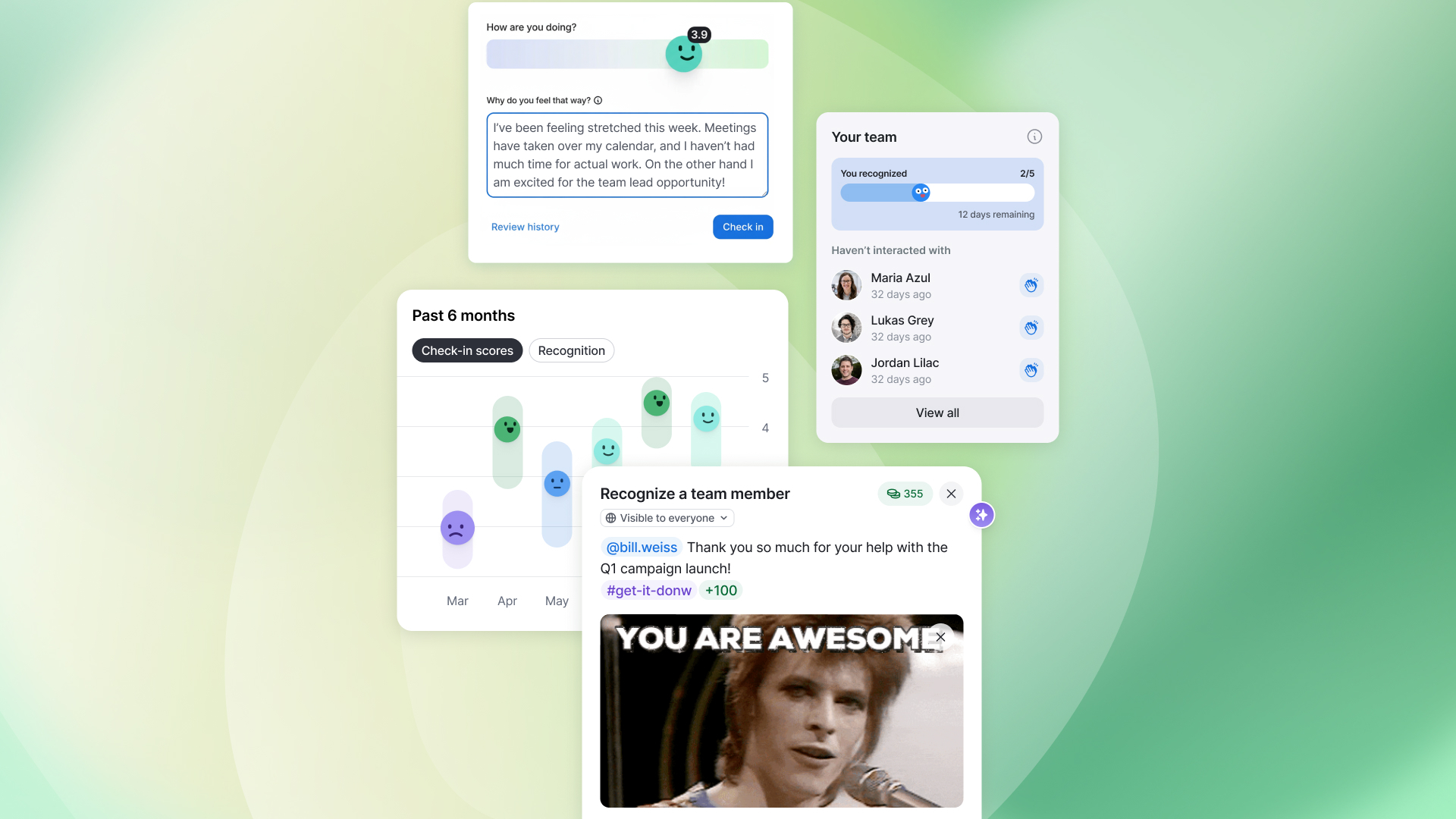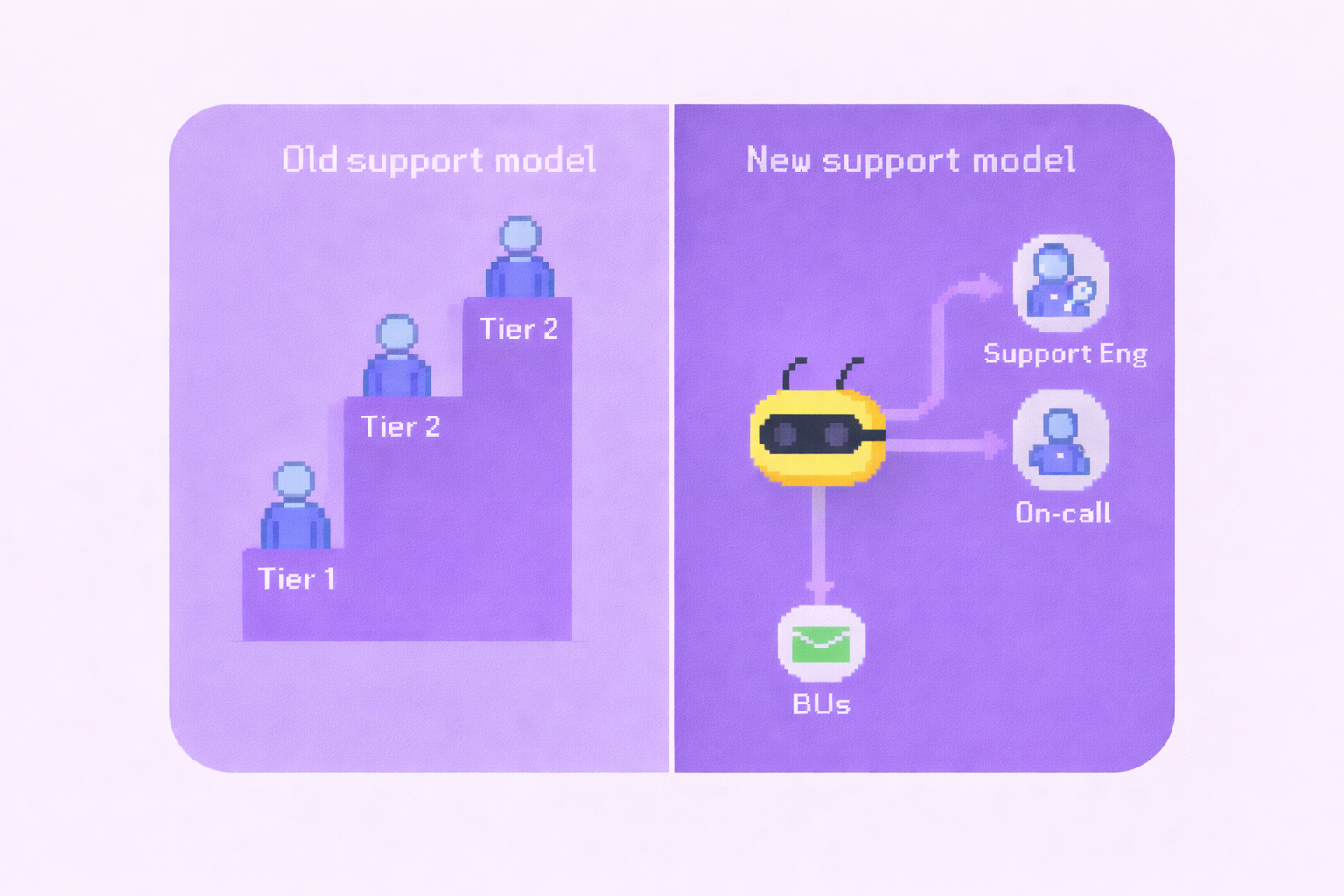Recognition vs. Appreciation at Work, and Why You Need Both

Recognition gets a whole lot of airtime these days when we’re talking about employee experience, engagement, retention, and everything else that makes businesses succeed and people perform at their best. (Bonusly included—we’ve got a whole section on our blog dedicated to the topic!)
But with all the much-deserved love given to recognition, another equally important element of the employee—and human—experience is often overlooked: appreciation. Let’s dive into why appreciation is not the same as recognition, why they’re more powerful together, and why your business should embrace appreciation to succeed.

Recognition vs. appreciation
Too often, recognition and appreciation are used interchangeably. And while they’re certainly connected, there’s a vital difference in the two concepts that matters if you’re trying to create a workplace where everyone feels seen, supported, and engaged.
Here’s the breakdown: recognition is about what someone does—the results they get, the milestones they hit, and the progress they achieve. Appreciation, on the other hand, is about who someone is—the work they put in, the way they collaborate with others, and the way they make your team and your company a better place to work.
Appreciation is a way to show gratitude for a person's value, and recognition is a way to show gratitude for their actions. Recognition is conditional upon achievements and results, while appreciation celebrates peoples’ intrinsic selves.
While recognition and appreciation differ, you need both elements to create a company where employees enjoy working, and where they’re motivated to perform at their best. In fact, they work better when paired. But since appreciation gets a lot less buzz than recognition right now, let’s cover why it deserves to be a higher priority for every business.
Why appreciation matters at work
Recognition is, of course, critical to the success of any company (just check out all the data on the ROI of recognition for proof). But there’s a natural limit to how much recognition you can give people, not everyone can get the maximum bonus, an annual promotion, or an award. Plus, your employees can work hard and work well and still not achieve the desired result, and recognition would feel inauthentic.
Appreciation, however, can go to everyone, all the time, just for being themselves. Let’s take the example of an employee who led a team to get an innovative new project off the ground. It took months of hard work, strategic thinking, and leadership, but due to external market conditions, the project didn't succeed. The employee’s dedication to the task and the team merits plenty of appreciation, even if the results don’t warrant recognition.
And imagine you’re that employee, feeling discouraged and down after putting in those months of work. Even a small gesture of appreciation—a handwritten note, a kind email—can mean the world, because it shows that the company, and their managers and peers, value them as a person, not just for what they achieve.
How to balance recognition and appreciation
All this talk about how amazing appreciation might seem like it’s more important than recognition, and that’s not true. They both play an absolutely vital role in employee engagement and retention, and generally in creating a company that people love to work for.
Recognition is critical because, of course, you’re running a business and you do want to reward outcomes and results. You have targets to hit, and recognition helps you celebrate the people who take your business across that finish line. Plus, employees also want to be recognized for the results they produce when they’re successful—it feels great to hit those milestones and reap the rewards.
But unfortunately, appreciation is missing in many workplaces, and so the balance is tilted towards rewarding results and accomplishments only. This can leave many hard-working employees feeling lonely and discouraged more than they should when something doesn’t pan out as they hoped.
Finding a way to encourage managers, leaders, and colleagues to both recognize and appreciate employees begins with effective communication about why both elements are essential. Let people know what you expect of them, and why it matters from both a human and a business perspective, and you’ll begin to build a better workplace culture.
The business case for appreciation
Appreciation is not about giving participation trophies for simply showing up—that would be inauthentic, and that’s the opposite of effective appreciation. Plus, accountability and standards still matter when giving appreciation. It’s really about ensuring that everyone in your workplace feels like they’re valued for their whole selves, not just their contributions to the quarterly quotas you’ve set.
And this feeling has more benefits than giving everyone a warm, fuzzy glow (although that’s lovely!). Psychological safety is a term that’s used a lot because more and more organizations understand that it’s a key component in creating innovative cultures, and it can sound complex. But at its core, it’s about creating group trust—knowing that you can make a mistake or fail and still be a valued member of your team.
Without that feeling of safety, taking risks is frightening for employees at all levels. Appreciation can foster a culture of continuous learning and trying new things because your people know that they don’t need to fear failure; they’ll still be welcomed and celebrated and secure even if the risk they took doesn’t pan out.
When we work in a place filled with people at all levels who we know care about us, we not only want to work harder—we want to push the envelope (intelligently) and see what we can do for the company, our colleagues, and our leaders.
And that combination of recognition and appreciation gets better results than recognition alone. According to a study by the Haas School of Business at UC Berkeley, when people were recognized for work they did well, they were 23% more effective and productive than those who weren’t recognized. Yet, when people felt valued and cared for by the team—appreciated, in other words—they were 43% more effective and productive than people who weren’t valued.
Speaking of leaders, appreciation isn’t any less valuable for them. In fact, managers and leaders often get the least amount of genuine appreciation (not recognition or compensation based on their position and power, but pure appreciation for who they are). It can be extra meaningful to deliver some well-deserved appreciation to those above you, as long as it’s done without an ulterior motive.

The takeaway
While appreciation is not a brand-new or groundbreaking idea, it’s often sorely missing in our workplaces, and that makes them a less pleasant place to be. Adding appreciation into your recognition strategy can make a big difference in your employee experience and your retention rates too—people tend to stay in workplaces that reward both results and everything else they contribute to the team.
Looking for a way to make recognizing your employees’ accomplishments and appreciating everything else they do easier and more instinctive? That’s the key to making both elements more frequent so they become an integral part of your company culture. Bonusly is here to help—see for yourself.
.png)







